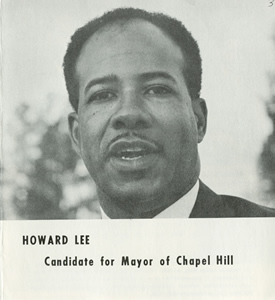Howard Nathaniel Lee facts for kids
Quick facts for kids
Howard Lee
|
|
|---|---|

Lee in a pamphlet published
during his 1969 mayoral campaign |
|
| Chair of the North Carolina State Board of Education | |
| In office 2003–2009 |
|
| Governor | Mike Easley Bev Perdue |
| Preceded by | Phil Kirk |
| Succeeded by | William C. Harrison |
| Member of the North Carolina Senate from the 16th district |
|
| In office January 1, 1997 – January 1, 2003 Serving with Eleanor Kinnaird
|
|
| Preceded by | Fred M. Hobbs Teena Smith Little |
| Succeeded by | Eleanor Kinnaird (Redistricting) |
| In office January 1, 1991 – January 1, 1995 Serving with Russell Grady Walker
|
|
| Preceded by | Wanda Holder Hunt |
| Succeeded by | Fred M. Hobbs |
| Secretary of the North Carolina Department of Environmental and Natural Resources | |
| In office January 10, 1977 – July 31, 1981 |
|
| Governor | Jim Hunt |
| Preceded by | George Little |
| Succeeded by | Joseph W. Grimsley |
| 28th Mayor of Chapel Hill | |
| In office 1969–1975 |
|
| Preceded by | Sandy McClamroch |
| Succeeded by | James Wallace |
| Personal details | |
| Born |
Howard Nathaniel Lee
July 28, 1934 Lithonia, Georgia, U.S. |
| Political party | Democratic |
| Spouse |
Lillian Wesley
(m. 1962) |
| Alma mater | Fort Valley State College |
| Military service | |
| Allegiance | |
| Branch/service | |
| Years of service | 1959–1961 |
Howard Nathaniel Lee (born July 28, 1934) is an American politician. He made history as the first African-American mayor of Chapel Hill, North Carolina. He was also the first African American to be elected mayor of any city in the South where most residents were white. He served as mayor from 1969 to 1975.
Contents
Howard Lee's Early Life and School Days
Howard Nathaniel Lee was born on July 28, 1934. He grew up on a sharecropper's farm near Lithonia, Georgia. A sharecropper is a farmer who works land owned by someone else and pays rent with a share of the crops.
In 1953, Howard graduated from Bruce Street High School. He then started college at Clark College in Atlanta. This was a historically black college. In 1956, he moved to Fort Valley State College. He graduated in 1959, becoming the first person in his family to earn a college degree.
Serving His Country and Standing Up for Rights
In the summer of 1959, Lee joined the U.S. Army. He completed his basic training in Georgia. He then trained as a medical corpsman in Texas. While stationed at Fort Hood, he organized two peaceful protests called sit-ins. These protests were in the town of Killeen. He was protesting public places that were separated by race.
After his second sit-in, Lee was sent to South Korea. He worked as an ambulance driver and assistant company clerk. He served there until he was honorably discharged in 1961.
After the army, Lee moved to Savannah, Georgia. He worked as a juvenile probation officer. In 1962, he married Lillian Wesley. They moved to North Carolina in 1964. There, he earned a master's degree in social work from the University of North Carolina at Chapel Hill. By 1965, he was teaching at both Duke University and North Carolina Central University.
Howard Lee's Journey in Politics
Howard Lee decided to get involved in local politics after facing racial issues in his neighborhood. In February 1969, he announced he would run for mayor of Chapel Hill. Many people voted in that election, with a record 4,734 votes.
On May 6, 1969, Lee was elected mayor of Chapel Hill. This was a very important moment. He was the first African American to be elected mayor in a city where most people were white. He was also the first African American to be elected mayor in the South since the Reconstruction Era after the Civil War. He won by a small number of votes at first. However, he was re-elected two more times. Each time, he won with more votes: 64 percent in 1971 and 89 percent in 1973.
In 1976, Lee ran for Lieutenant Governor of North Carolina. He won the first round of voting but lost in a second round. In 1977, Governor Jim Hunt appointed Lee to a state leadership role. He became the Secretary of the North Carolina Department of Natural Resources and Community Development. He held this job until 1981.
Lee returned to elected politics in 1990. He was elected to the North Carolina Senate. He served from 1990 to 1994, and again from 1996 to 2002. While in the Senate, he focused on improving public education.
In 2003, the North Carolina State Board of Education chose Lee as its chairman. In 2009, Governor Beverly Perdue appointed him to lead the N.C. Education Cabinet. This group includes leaders from public schools, community colleges, and universities. Because of this new role, Lee left the Board of Education.
Lee also served on the North Carolina Utilities Commission. This group helps make rules for things like electricity and water services. Governor Mike Easley appointed him to this role in 2005.
In 2009, Howard and Lillian Lee were honored as "Town Treasures" by the Chapel Hill Historical Society. This recognized their important contributions to the community.
Helping Others: Howard Lee's Non-Profit Work
After retiring, Howard Lee started the Howard N. Lee Institute. This organization works to help minority males do better in school. It focuses on closing the "achievement gap," which means helping all students reach their full potential.
See also
 | Aaron Henry |
 | T. R. M. Howard |
 | Jesse Jackson |

